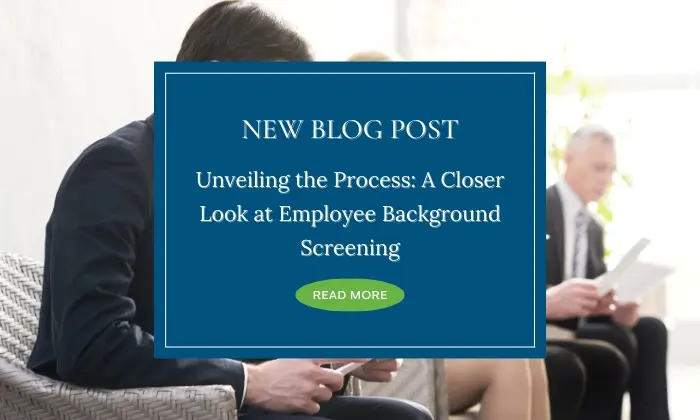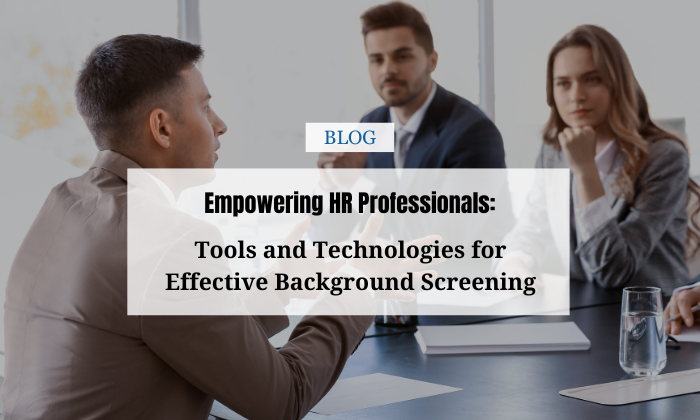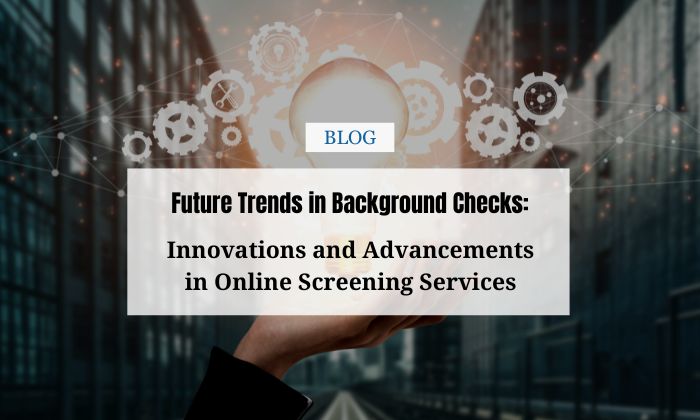In today’s ever-evolving job market, one thing that remains constant is the need for employers to make informed hiring decisions. But how do we ensure that we’re selecting the right individuals, those who not only possess the necessary skills but also align with our company’s values?
This is where the process of employee background screening comes into play. It’s a practice that has gained immense importance in recent years, offering employers a vital tool for assessing the trustworthiness and suitability of potential hires.
One of the pivotal elements in the realm of background screening is the FCRA Act or the Fair Credit Reporting Act. Understanding the nuances of this federal legislation is crucial for both employers and candidates.
And where do all these background details reside? That’s where the background check database enters the picture. It’s the virtual repository of information that employers turn to in order to uncover the truth about their potential employees.
So, if you’re an employer striving to create a safe and reliable workforce or a job seeker looking to understand what happens behind the scenes of the hiring process, you’re in the right place.
Securecheck360
Here at Securecheck360, we’re experts in delivering top-notch Employment Background Screening Services, serving businesses of all sizes across the globe. Our customized solutions are finely tuned to meet the unique requirements of small, mid-sized, and large organizations. We’re dedicated to equipping companies with the vital tools and insights they need to make well-informed hiring choices. As one of the leading background verification companies, we’re committed to supporting even small businesses as trusted background check companies for small businesses to ensure they have the confidence to build the best teams for their success.
To know more about our services, book your free demo today!
The Purpose of Employee Background Screening
So, what’s the driving force behind employee background screening? Well, it boils down to ensuring that the workplace is a safe, secure, and productive environment for all. Employers take this process seriously because they understand that the people they bring on board have a direct impact on the company’s success.
- Ensuring Workplace Safety: Employee background screening aims to create a safe and secure work environment for everyone involved.
- Compliance with FCRA Act: The process operates within the guidelines of the FCRA Act (Fair Credit Reporting Act), which governs the use of consumer reports, including credit reports, during hiring.
- Assessing Criminal History: Screening includes examining federal criminal records to identify any potential risks that a candidate’s criminal history may pose to the organization.
- Background Verification: Employers verify aspects like employment history and educational credentials to ensure the accuracy of the information provided by candidates.
- Utilizing Background Check Databases: Background screening relies on background check databases, which consolidate information from various sources to provide a comprehensive view of a candidate’s background.
Types of Employee Background Checks
Employee Background Checks come in various forms to ensure safe and informed hiring decisions. These checks include criminal background checks, employment history verification, education and credential verification, credit checks, reference checks, drug testing, and database searches.
1. Criminal Background Checks:
Purpose: When it comes to employee background screening, one of the initial steps often involves criminal background checks. The primary goal here is to ensure a safe and secure work environment for all.
Process: This process includes digging into a variety of sources, including federal criminal records, state databases, and local records. The objective is to uncover any past convictions or pending charges that could have implications for a candidate’s suitability for a particular role.
Significance: Criminal background checks hold particular importance, especially in roles where trust and security are paramount, such as positions involving financial responsibilities or working with vulnerable individuals.
2. Employment History Verification:
Purpose: Another crucial aspect of background verification involves confirming the accuracy of a candidate’s employment history. This helps ensure that the work experience they’ve presented aligns with reality.
Process: Employers reach out to former employers to cross-check essential details such as job titles, dates of employment, job responsibilities, and reasons for leaving. This step ensures that candidates’ qualifications are consistent with their stated experience.
Relevance: Employment history verification is standard practice in the employee background screening process, empowering employers to make informed decisions based on a candidate’s qualifications and experience.
3. Education and Credential Verification:
Purpose: Ensuring the legitimacy of a candidate’s educational qualifications and professional credentials is vital to establishing their suitability for the role.
Process: This entails reaching out to educational institutions and certification authorities to authenticate degrees, licenses, and other credentials claimed by the candidate.
Importance: Education and credential verification hold significant weight, especially in roles where specific educational requirements or certifications are essential, such as healthcare or engineering positions.
4. Credit Checks:
Purpose: Credit checks serve as a valuable tool for assessing a candidate’s financial responsibility and integrity, especially in positions where financial trust is a key factor.
Process: Employers review a candidate’s credit report, examining elements such as outstanding debts, payment history, and credit scores. This information aids in evaluating financial trustworthiness.
Applicability: Credit checks are prevalent in financial sectors and roles that entail access to sensitive financial data, aligning with the FCRA act to promote responsible hiring practices.
5. Reference Checks:
Purpose: Reference checks provide valuable insights into a candidate’s character, work ethic, and overall suitability for the role.
Process: Employers contact individuals listed as references by the candidate to gain a deeper understanding of their professional experiences. References are typically questioned about the candidate’s performance, reliability, and interpersonal skills.
Value: Reference checks offer a holistic view of a candidate’s professional background, assisting employers in making well-rounded hiring decisions.
6. Drug Testing:
Purpose: In roles where safety and sobriety are paramount, drug testing is a crucial component of the employee background screening process.
Process: Candidates may be required to provide various samples (urine, blood, hair, etc.) for analysis to detect the presence of drugs or alcohol.
Applicability: Drug testing is prevalent in safety-sensitive industries such as transportation, healthcare, and manufacturing, aligning with the importance of maintaining a safe workplace.
7. Background Check Databases:
Purpose: Background check databases function as comprehensive resources, streamlining the background screening process by aggregating information from various sources.
Process: These databases consolidate data from criminal records, public records, and other relevant sources to provide a comprehensive overview of a candidate’s background.
Advantage: Database searches empower employers to efficiently access a wealth of information, facilitating a more comprehensive evaluation of a candidate’s history and suitability for the role.
Legal Considerations
Ensuring a comprehensive and lawful employee background screening process is paramount for employers. Several legal aspects must be taken into account to protect both the organization and the candidate.
- FCRA Act Compliance: The FCRA act (Fair Credit Reporting Act) is a cornerstone of background screening. Employers must strictly adhere to its provisions when conducting checks involving consumer reports, including credit reports. Compliance involves obtaining proper consent from candidates, providing pre-adverse action notices, and allowing candidates the opportunity to dispute any adverse findings.
- Anti-Discrimination Laws: Employers must be mindful of anti-discrimination laws, such as Title VII of the Civil Rights Act of 1964. Background checks should not disproportionately impact protected groups. Employers must apply consistent criteria and make decisions based on job-related factors.
- Ban the Box Laws: Some jurisdictions have implemented “ban the box” laws, which restrict employers from asking about criminal history on initial job applications. Compliance with these laws varies by location and should be considered during the hiring process.
- Consent and Disclosure: Obtaining background verification consent and providing proper disclosure is crucial. Candidates should be informed about the nature and scope of the background check and must willingly provide their consent before it is conducted.
- Individualized Assessments: When evaluating findings related to federal criminal records or other adverse information, employers should conduct individualized assessments. This means considering the nature of the offense, its relevance to the job, and the time that has elapsed since the offense.
- Data Privacy Laws: Compliance with data privacy laws is essential, especially when dealing with a background check database. Employers must protect sensitive candidate information and adhere to data protection regulations, such as the European Union’s GDPR (General Data Protection Regulation).
- Recordkeeping: Employers must maintain records related to background screening processes as required by law. These records may include consent forms, adverse action notices, and other documentation related to the screening process.
The Screening Process
Employee background screening is a critical step in the hiring process, ensuring that organizations make well-informed and responsible hiring decisions while maintaining compliance with the FCRA act. Here’s a breakdown of the typical screening process:
- Candidate Consent and Disclosure: It all begins with obtaining the candidate’s consent and providing a clear disclosure regarding the background screening process. Candidates should be informed about what checks will be conducted and why they are necessary.
- Data Collection: After obtaining consent, the employer collects relevant information from the candidate. This may include personal details, employment history, educational qualifications, and more, depending on the scope of the background check.
- Background Verification: The heart of the process involves background verification, which may encompass criminal history checks, employment history verification, education and credential validation, credit checks, reference checks, drug testing, and utilizing a background check database.
- Compliance with FCRA: Throughout the screening process, strict adherence to the FCRA act is crucial. This involves ensuring the accuracy and fairness of the screening process, providing candidates with pre-adverse and adverse action notices if negative findings arise, and giving candidates the opportunity to dispute any inaccuracies.
- Evaluation and Individualized Assessments: When evaluating findings, especially related to federal criminal records, employers often perform individualized assessments. This entails considering the nature of the offense, its relevance to the job, and the time that has passed since the offense occurred.
- Decision-Making: Employers use the information gathered during the screening process to make informed hiring decisions. They assess a candidate’s qualifications, trustworthiness, and suitability for the role, all while complying with legal requirements and anti-discrimination laws.
- Notification to the Candidate: Following the decision-making process, candidates are typically informed of the outcome. If the decision is based on negative findings, candidates receive a pre-adverse action notice, allowing them the opportunity to address or explain any discrepancies before a final decision is made.
- Recordkeeping: Lastly, employers maintain records of the screening process as required by law. This includes consent forms, background check reports, and any correspondence with candidates. Keeping thorough records helps demonstrate compliance with legal regulations.
Employee background screening, when conducted responsibly and in accordance with the law, plays a vital role in creating safe and trustworthy work environments. It allows employers to make well-informed hiring choices while respecting candidates’ rights and ensuring a fair and transparent process for all parties involved.
Benefits of Employee Background Screening
Employee background screening offers several advantages to organizations and candidates alike, contributing to a safe and productive work environment while ensuring compliance with the FCRA act. Here are the key benefits:
- Enhanced Workplace Safety: Perhaps the most significant benefit is the assurance of a safer workplace. By conducting employee background screening, employers can identify candidates with problematic histories, thus reducing the risk of potential workplace incidents and ensuring the well-being of employees.
- Legal Compliance and FCRA Adherence: Background checks are essential for legal compliance, especially when dealing with sensitive information like federal criminal records. Adhering to the FCRA act ensures that employers follow regulations, thereby avoiding potential legal issues.
- Trustworthy Hiring Decisions: Employee background screening helps employers make informed and trustworthy hiring decisions. By verifying qualifications, checking references, and examining criminal histories, organizations can confidently select candidates who align with their values and requirements.
- Protection of Company Reputation: Maintaining a positive company image is crucial. Background screening helps mitigate the risk of hiring individuals who could harm the organization’s reputation through misconduct, fraud, or unethical behavior.
- Reduction in Employee Turnover: By selecting candidates whose qualifications and backgrounds are accurately represented, organizations can reduce employee turnover rates. A well-matched employee is more likely to stay with the company long-term.
- Minimized Liability: Employers can minimize their liability by conducting thorough background checks. By identifying potential risks during the screening process, organizations can take steps to prevent future legal and financial repercussions.
- Improved Security and Confidentiality: In roles involving sensitive data or customer information, background screening ensures that employees are trustworthy and can be trusted to maintain confidentiality and security.
- Enhanced Workplace Productivity: A well-structured background screening process contributes to a more productive work environment. It enables organizations to identify candidates with the right skills and qualifications, thus improving overall team performance.
- Adherence to Industry Standards: In some industries, like finance or healthcare, employee background screening is a standard practice. Adhering to industry-specific regulations ensures that an organization remains competitive and credible.
- Fair and Transparent Process: Employee background screening also benefits candidates by providing a fair and transparent hiring process. Candidates are informed about the checks being conducted, and they have the opportunity to address any discrepancies.
Challenges and Pitfalls
While employee background screening is a crucial process, it comes with its own set of challenges and potential pitfalls, which employers must navigate effectively to ensure compliance with the FCRA act and other relevant regulations. Here are some common challenges:
- Incomplete or Inaccurate Information: One of the primary challenges is obtaining comprehensive and accurate data. Candidates may provide incomplete or misleading information, making it crucial to verify details through background verification.
- Evolving Legal Regulations: Keeping up with ever-evolving legal regulations, including those related to federal criminal records, can be challenging. Non-compliance can result in legal issues and fines, emphasizing the need for ongoing legal awareness.
- Discrepancies and False Positives: The screening process may occasionally yield discrepancies or false positives, where a candidate’s background check suggests issues that do not apply to them. Handling such situations with care is essential to avoid unfair discrimination.
- Privacy Concerns: Balancing the need for thorough screening with respect for candidate privacy is a constant challenge. Employers must adhere to data protection laws while conducting background checks, especially when using a background check database.
- Differing State and Local Laws: The complexity of background screening is further compounded by varying state and local laws. What’s permissible in one jurisdiction may not be in another, making it essential for employers to navigate these differences effectively.
- Delays in the Hiring Process: Extensive background checks can lead to delays in the hiring process, potentially causing the loss of top candidates to other opportunities. Striking a balance between thorough screening and timely hiring is crucial.
- Adverse Action Procedures: Complying with adverse action procedures, as required by the FCRA act, can be challenging. Employers must provide candidates with pre-adverse action notices and allow them to dispute findings, ensuring a fair and transparent process.
- Cost Considerations: Running comprehensive background checks can be costly, particularly when utilizing multiple sources and databases. Employers must balance the need for thorough screening with budget constraints.
- Handling Sensitive Information: Managing sensitive information, especially in roles involving access to background check databases, demands stringent security measures. Mishandling data can lead to breaches and legal repercussions.
- Diversity and Inclusion Concerns: Overreliance on background checks can inadvertently exclude candidates from diverse backgrounds. Ensuring that the screening process does not disproportionately impact protected groups is a continual challenge.
Conclusion
Employee background screening, governed by the FCRA act and involving scrutiny of federal criminal records, is a critical element of responsible hiring. While it enhances workplace safety and promotes trustworthy decisions, it also presents challenges like legal compliance and privacy concerns. Striking a balance is key. By staying updated on regulations, respecting privacy, and fostering inclusivity, organizations can leverage background screening for secure and reliable workplaces, ultimately benefiting both employers and candidates.







